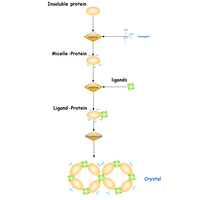| PPD301 | |
| ID |  PPD301 |
| Project ID | PPD3 [Protein] [PREIMS] |
| Subject | Antibody production for Membrane Protein Crystallization |
| Project Theme | Antibody production for Membrane Protein Crystallization |
| Principal Investigator | So Iwata |
| Affiliation | Graduate School of Medicine, Kyoto University |
| Backgrounds | - Purification and crystallization are major bottlenecks in structure determination of membrane proteins since they are naturally unstable in detergents used for solubilization This problem has been addressed by binding an antibody fragment to the specific part of membrane proteins |
| Highlights | - Antibody generation methods to raise and screen monoclonal antibodies that specifically recognize mammalian membrane proteins have been established - The antibody co-crystallisation approach improves the quality of the crystals and the resolution of structures We have successfully determined the structure of human A2A adenosine receptor in complex with the antibody Fab fragment |
| Outline | Purification and crystallization are major bottlenecks in structure determination of membrane proteins. Detergents used for solubilization of membrane proteins form micelles that envelop membrane proteins, preventing their crystallization. This problem has been addressed by binding a Fab antibody fragment to the intracellular part of the membrane protein, dramatically increasing the potential surfaces for making crystal contacts. We demonstrated the utility of the antibody fragment co-crystallisation for the structural analysis of a bacterial membrane protein in 1995. Here we will develop the technology platform for the antibody co-crystallisation approach that can be applied for a broad range of mammalian membrane proteins. Antibodies are raised by mouse immunization. A newly developed method enables the immunization with membrane proteins retaining their native conformations in membranes to raise antibodies that specifically recognize mammalian membrane proteins. Furthermore, we developed a novel antibody screening method that ensures both time and cost savings. Using the established technology platform, we could generate several antibody fragments that specifically recognize mammalian membrane proteins. Structural analyses of some membrane proteins in complex with their antibody fragments confirmed the high-resolution nature of the antibody co-crystallisation approach. |
| Application | - |
| Article | - |
| CSML File | PPD301.csml |